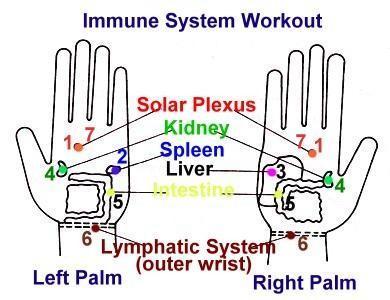Try the pressure points on your hand with a pulsing or a holding press for about a minute. See if you yawn!
If you have yawned then you body was letting go to relieve stress. read more below
Letting go (i.e. discharging) is necessary for relieving stress. If your nervous system has trouble letting go, the excess energy gets stored in your body, through holding patterns in the muscles and fascia.
Can't let go of the stress. The stress effects on the body remain long after the event. They show up in physical areas like tight shoulder muscles, a heavy chest or soreness in old injuries to name a few.
Discharge and your nervous system
Discharge is a natural process in which the nervous system let's go of energy. Individuals who are better at discharge have fewer bouts of feeling keyed up or restless. And, they have an easier time letting go of things that bother them including muscle tension and stress.
Common forms of discharge
They include a good yawn (especially shudder-type yawns), heat, twitches, giggling, and tears.
The nervous system is discharging all the time, even when we're asleep. We notice the discharge process is working only through a sense of decreasing tension in our nerves and muscles.
A nervous system that's not working as it was intended does not discharge its accumulated energies smoothly. In contrast, a healthy nervous system discharges easily and seamlessly.
So for example, if you have a healthy nervous system you will settle down quickly after a stressful experience. You will also be able to relax for extended periods of time without feeling restless.
The above info is from www.MyShrink.com
Chiropractic at the 2012 London Olympics - News from Lula Health Care
There are few athletic events that engender worldwide fascination like the Olympics, where the world’s greatest athletes come together to showcase their superior athletic skills. They train for years, and when the games finally begin, they must be in top form. So how do they keep themselves in good shape under a training regime that involves day after day of grueling training? Many have found chiropractic care to be instrumental in keeping them in good form, treating injuries before they become a more major problem. Though chiropractic care was first incorporated into the official polyclinic at the 2010 winter Olympic Games in Vancouver, this is the first time chiropractors will be included as part of the official medical team at the summer Olympic Games, this time in London, working in the official Olympic polyclinics and at the venues themselves.
Chiropractic care has been proven to improve athletic performance by almost 17 percent. That’s a nice edge when competing with other elite athletes. Chad Woolner, a chiropractor from Boise, Idaho, will be providing chiropractic care for an athlete competing this summer in London and says, “Athletes these days are in the most competitive atmosphere we have ever seen. Chiropractic care plays a huge role within musculoskeletal performance, protection against injury, and recovery from injuries.”
Kay Pearce of the Maristow Chiropractic Clinic in Westbury, UK, explains how chiropractic at the 2012 Olympics will work: “Working within our scope of practice, chiropractors will use their knowledge, skills and experience to provide pre-event and post-event treatments to athletes of all nationalities. The team will have particular responsibility to see international athletes who do not have their own medical staff and will work closely with the medical professionals, which also includes sports medicine doctors, radiologists and podiatrists. We will provide backup advice and support for national team medical staff and are likely to be sourced by athletes who are used to receiving chiropractic treatment, but whose own medical staff does not include a chiropractor at the Games.”
Athletes will be able to utilize the services of official medical team chiropractors to treat any sudden injuries or for preventive care. For an injury, the athlete will first be examined by a physician in the polyclinic’s emergency room or by a physician of sports medicine at the clinic. If any additional tests are necessary such as an MRI, CT scan or x-ray, they are available. At that point the athlete will be referred to a member of the therapy group, where chiropractic care can be used either alone or in combination with other physical therapies such as physiotherapy, osteopathy and sports massage.
Chiropractor Dr. Tom Greenway of the European Chiropractors’ Union and the man responsible for arranging chiropractic care at the Olympics this summer said, “At the Olympics in 2012 we will be able to show them exactly what we can do, how well we can do it and how effectively that can dovetail with physiotherapy, osteopathy and massage…. We will have 74 days to show the world of sport how great and how effective a chiropractic approach is in the medical team.”
copyright 2012 - 2013 rights reserved, RiderAwareness - Norah Dombrowski

Wellness
Our health is everything!
Our health is everything!
Rider Health

Being positive around your horse!

Horses like all animals are very in-tuned to their surroundings, it's how they survive. We all have energy that is connected.
Stay positive around your horse and they will respond in a pleasant way. They really are very cooperative creatures. If you happen to get a rescue or a horse with baggage it is very important to be calm and positive around them to build trust.
We all have had a bad day and then think I'm going to ride - what happens - we have a bad ride. Change your frequency before getting on or keep your expectations minimal to something you know your horse can easily do. Then he can accomplish the task and you might be able to change your mood and frequency.
Stay positive around your horse and they will respond in a pleasant way. They really are very cooperative creatures. If you happen to get a rescue or a horse with baggage it is very important to be calm and positive around them to build trust.
We all have had a bad day and then think I'm going to ride - what happens - we have a bad ride. Change your frequency before getting on or keep your expectations minimal to something you know your horse can easily do. Then he can accomplish the task and you might be able to change your mood and frequency.
NEW WEBSITE UNDER CONSTRUCTION!